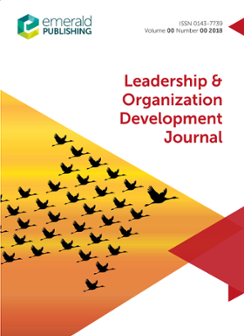Table of contents
How despotic leadership jeopardizes employees' performance: the roles of quality of work life and work withdrawal
Shazia Nauman, Connie Zheng, Ameer A. BasitThis study contributes to the leadership literature by examining how and when despotic leadership jeopardizes employees' performance. Specifically, we examine whether employees'…
Identity leadership and well-being: team identification and trust as underlying mechanisms
Henning Krug, Hannah V. Geibel, Kathleen OttoThe purpose of the present research was to examine the impact of identity leadership on employees' well-being mediated by team identification and trust in the leader.
“Too much of a good thing?”: exploring the dark side of empowering leadership by linking it with unethical pro-organizational behavior
Xue Zhang, Guyang Tian, Chao Ma, Yezhuang Tian, Zhongqiu Li, Liang LiangGrounded in social exchange theory (SET), the purpose of this paper is to examine the relationship between empowering leadership and unethical pro-organizational behavior (UPB)…
Generational differences and implicit leadership schemas in the Philippine workforce
Helen C. Salvosa, Maria Regina M. HechanovaThis study examined generational differences in traits and desired schemas of leaders among Filipino workers using the lens of the generational cohort theory.
Transformational leadership and employee communication behaviors: the role of communal and exchange relationship norms
Yeunjae Lee, Myoung-Gi ChonThis study aims to examine the effects of transformational leadership on employees' internal (i.e. voice) and external (i.e. megaphoning) communication behaviors and to explore…
The effect of exploitative leadership on knowledge hiding: a conservation of resources perspective
Limin Guo, Ken Cheng, Jinlian LuoDrawing on conservation of resources (COR) theory, this study aims to explore the influencing mechanism of exploitative leadership on knowledge hiding. Specifically, this study…
Red tape and change-supportive intention: an extension of the theory of planned behavior
Hemin Ali Hassan, Xiaodong Zhang, Ahmad Bayiz AhmadThis paper builds on and extends the theory of planned behavior (TPB) by examining empirically the underlying mechanism through which red tape is associated with employee…
The chain mediation effect of spiritual leadership on employees' innovative behavior
Jie Yang, Mingchao Chang, Zhihong Chen, Lulu Zhou, Jiangjiang ZhangBased on the intrinsic motivation theory and spiritual leadership theory, the current study proposes a chain mediation model for testing the linkage between spiritual leadership…
Transformational leadership and employee outcomes: the mediating role of psychological empowerment
Saira Saira, Sadia Mansoor, Muhammad AliThe purpose of this study is to empirically test the mediating effect of psychological empowerment in the relationship between transformational leadership and two employee…
Understanding organizational change management: the role of micro and macro influences
Erika Harden, Lucy R. Ford, Marshall Pattie, Patricia LanierIn response to external conditions, organizations yearn to gain a competitive edge during unremitting change. Recognizing the importance of managing change, researchers have…

ISSN:
0143-7739Online date, start – end:
1980Copyright Holder:
Emerald Publishing LimitedOpen Access:
hybridEditors:
- Professor Martin McCracken
- Prof Paul Humphreys